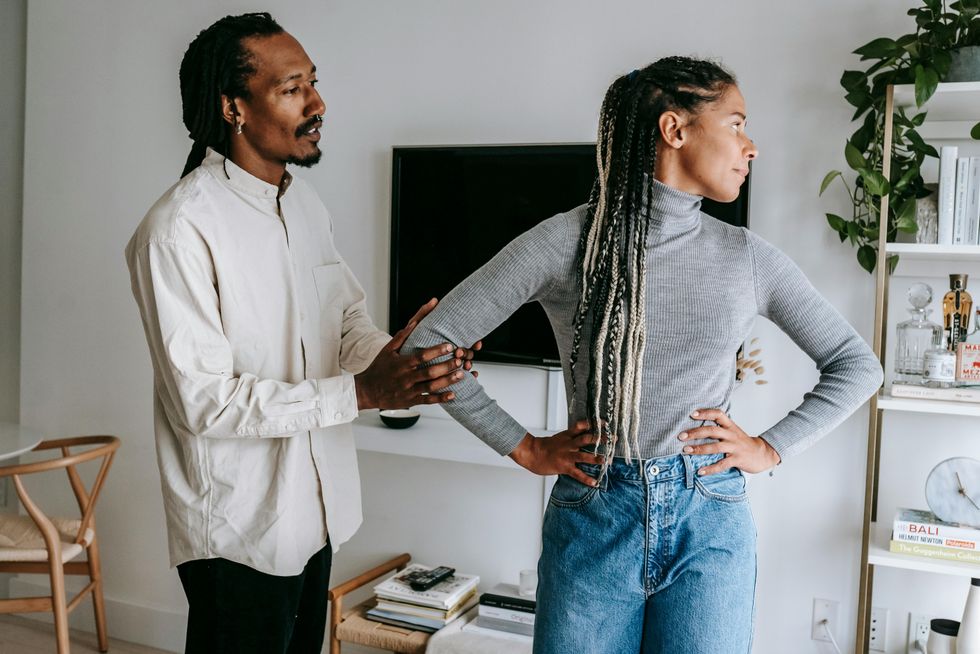You don't need their negativity.
6 Best Responses To Stop A Narcissist In Their Tracks (Or At Least Set Some Boundaries)
Staff Writer, Jasmine Williams, covers a variety of topics from home decor to beauty and everything in between. She has bylines at Motherly, The Everymom, and Byrdie where she wrote about motherhood, beauty, health and relationships. Jasmine knew she wanted to be a writer when she realized she was actually interested in reading the articles in her mom's favorite magazines — and she may or may not have ripped her favorite articles out to study them later. When she's not working, you can find Jasmine playing make-believe with her toddler, spending an undisclosed amount of time in Target or TJ Maxx, and searching for a family-friendly puppy to add to her family.
Having toxic friends, family members, or romantic partners in your life can feel like standing in the rain for hours on end. You usually feel drained of energy on top of being drenched in bad energy. Though it's clear you probably need to set boundaries, it's not always easy to decipher what you should say during a conversation where a narcissist is doing what they do best.
Clinical social worker, and Clinical Director of Villa Oasis San Diego, Michelle Beaupre, MSW, Ph.D., LCSW has helped clients navigate this very topic at different points in their lives and has 6 phrases you can say to either shut down a narcissist or let them know you're uninterested in their behavior.
6 things to say when a narcissist thinks they're getting the last word
1. What to say if your romantic partner makes you question whether you saw inappropriate texts on their phone

If I had things my way, gaslighting would be outlawed. Unfortunately, some people just can't seem to take responsibility for their actions, and they really love to make it everyone else's problem. Even more infuriatingly, it can appear in romantic relationships when one person is caught doing something that breaches the trust between them and their partner.
If your boyfriend or girlfriend spins a tale that makes you question what you’re sure you saw, try not to panic. Instead, take a page from Beaupre’s book. She suggests saying, “I’ll stand by what I know is true. If we need to agree to disagree, that’s fine, but I’m not going to let this change what I know or how I feel.”
She says doing this “shows them you’re not going to be swayed or pulled into their ‘game.’” It also helps “keep you grounded and firm, making it clear that their gaslighting isn’t going to work.” The more you stand your ground, the more someone is “less likely to continue trying to manipulate/control you,” according to her.
2. What to say when a friend keeps lying about their accomplishments

This is a tricky one because you probably know one of your friends likes to embellish the truth a bit. It’s one of the things that used to be funny because they could always come up with a story on the spot. But, it can be confusing if you notice your friend tends to lie about something they’ve accomplished. Just don’t think you have to go out of your way to expose them though.
Beaupre says, “If it’s not harming anyone, sometimes it’s okay to leave it alone because, eventually, the truth will catch up to them anyway, and they will learn their lesson on their own.” But she says if you notice “their lies are causing major problems or hurting others,” speak up “gently.”
“You can ask them why they feel the need to lie, and if there’s something they’re struggling with that they might want to talk about,” she continues. Her suggestion is to say, “I’ve noticed that sometimes, you say things that don’t really add up, and I’m just wondering if there’s a reason. Is everything okay?”
3. What to say when someone complains about you setting boundaries

If there’s one thing a narcissist can’t stand, it’s boundaries. If you know someone who has a tendency to overreact when you set them, Beaupre knows what you can say to them. “I’m not okay with how you’re reacting. If you can’t respect my limit, then I’m going to have to take a step back and distance myself,” she suggests.
She feels “this makes it clear that you’re serious about your boundaries.” Also, it signals that you “won’t let their reaction change what you need to feel respected, safe and secure.”
4. What to say if someone utters "I love you" after a few weeks of dating

If only some of us would’ve asked this question during some of our prior relationships, we may have avoided unnecessary heartbreak. Should you find yourself faced with someone’s eager declarations of love early on, Beaupre wants you to “to be honest about how you feel and not feel pressured to say it back if you’re not ready.”
What you can say is, “Thank you. That means a lot, but I’m not there yet. Maybe one day, but not now.” By doing this, you’re not discrediting their emotions. Instead, you’re letting them “know you appreciate them and their feelings” while setting “the pace that works for you,” according to Beaupre. Please don't force yourself to feel something if you don't.5. What to say when someone makes light of something or someone you're grieving

This reminds us of one of the relationship red flags we recently dug into. We know why people say passive-aggressive things, but it's still painful no matter what the situation is. In the case of grieving, it's a hard no for us. Beaupre says, “In times like this, when you’re going through a lot of heavy emotions, it’s important to set a boundary for your peace.”
If you feel yourself questioning whether your feelings are valid, Beaupre says not to do that. "Don't let others downplay/dismiss what you’re feeling or going through, especially if it's something that's really taking a toll on you." What she urges you to say is, "I know you may not fully understand, but this is really important to me, and I need you to respect that.” In her opinion, it's a way of letting that person "know you're serious about protecting your emotional space without being confrontational."
And if they're still being a grade-A jerk about it? It may be time to limit the time you spend with them.
6. What to say if someone uses 'jokes' to constantly critique your appearance

We think laughter is good for the soul, but not at the expense of hurting other people's feelings. This means no one should have the luxury of repeatedly commenting about the way you present yourself. Beaupre says, "If the way you look, what you’re wearing or how you speak isn’t hurting anyone, they really shouldn’t be commenting on it." Should you notice this unfortunate pattern in someone close to you, it's time to address it.
Beaupre wants you to try saying, "I’m fine with how I look and speak. You can let me know if there's a problem, but please don’t make me feel bad about it." That way, you can "set a clear limit about what you won't tolerate," according to her. She believes it's also a "chance to share any concerns without crossing into criticism or bullying."
Still, someone who refuses to stop disguising their obvious issues with you as harmless 'jokes' isn't someone who deserves a long-term spot in your life.
Scroll through more relationships stories to see how you should navigate everything from tense friendships to conversations about money.




















